
MARS WATER ICE, CLOUDS, LIQUID
DROPS & LIFE: Part 1 of 2
Report #160
March 28, 2009
Recently there are additional
NASA revelations coming from the now failed Phoenix Mission getting additional
press exposure. This most recent news is that liquid
water drops may have been visually discovered collecting on a footpad strut
that is in the shade on the underside of the lander. Apparently close examination
of the drops indicate that some are actually expanding a little. This suggests
that moisture out of the atmosphere collected to these droplets increasing
their size.
Considering the official data depicting super freezing temperatures around
the Phoenix landing site in the Mars South Polar Region and the thin atmosphere,
this seems impossible. This of course guarantees controversy and debate within
the science community ranks. Take a look at the following link samplings to
come up to speed on this issue.
http://www.newscientist.com/article/dn16620-first-liquid-water-may-have-been-spotted-on-mars.html
http://www.universetoday.com/2009/02/18/has-liquid-water-been-detected-on-mars/
http://news.nationalgeographic.com/news/2009/02/090218-water-mars-phoenix.html
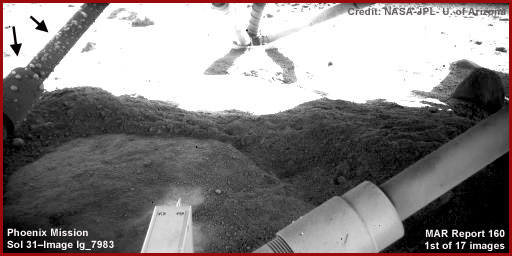
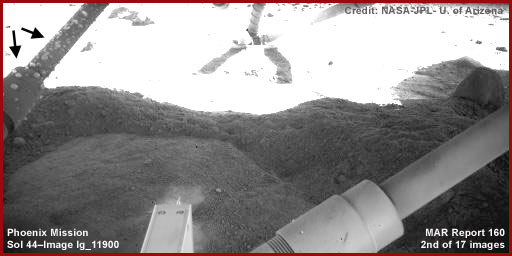
The above first and second images
taken on Mars Sol 31 and Sol
44 respectively after the Phoenix landing provide the best observation
of these drops on the landing strut as pointed out by the black arrows in
the upper left corner of each image. As poor as these images are, all other
views are darker and are of even lesser visual quality. Also note that these
black and white images are just as originally depicted.
I would have provided larger closer images but this evidence immediately corrupts
and looks terrible with even a small amount of zoom factor when dealing with
the publicly released images as the source. So, if any of this alleged measuring
process of such small indistinct objects represents truth, I suspect that
anyone being able to determine minute size changes must be working with much
better visual data not publicly available to us.
Note that this droplet evidence is in the shade on the underside of the lander.
The very bright sunlight on the terrain surface reflects back up under the
lander and then in turn reflects back down on the evidence illuminating it
from the lander's underside. You should also know that all the underneath
the lander shots are taken from a camera on the digger (backhoe) articulating
arm. When the arm folds and tucks under the lander, that means that the original
raw images are upside down in the raw science data and have to be flipped
vertically and horizontally to achieve this more normal right side up view.
Note that this also matches the view orientation released by the scientists.
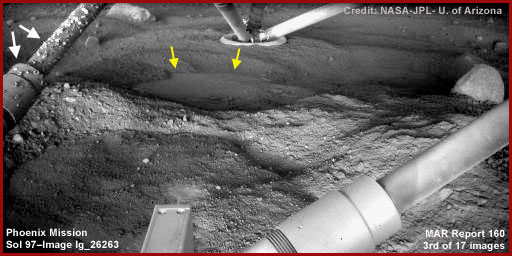
The above third image demonstrates
a view all the way out on Sol 97 many days later.
As you can see, after this lapse of time, the drops as pointed out by the
white arrows in the upper left corner on the landing gear strut now appear
to be dried up and crusted over. This obviously suggests evaporation of any
liquid that may have constituted them. That in turn tends to support the analysis
that these were indeed liquid droplets originally. However, it is at this
point that my examination and that of the scientists appear to deviate with
my work providing a little additional complementary information.
I draw your attention to what very much looks like a puddle as pointed out
by the two yellow arrows. This shot was obviously taken on an overcast day
or a different time of day so that strong reflective sunlight is not an obscuring
factor here as it was in my above first and second images. Note that there
appears to be a puddle in a small depression pointed out by the two yellow
arrows. Note on the left the ramp up of earth in line between the puddle and
this particular strut member with the droplet evidence on it. Obviously, a
combination of water and mud (soil) could be and no doubt was splashed up
on the strut by the force of lander braking thrusters melting surface ice
in this location and blowing the muddy liquid slush up and over this little
rise in the soil onto the strut.
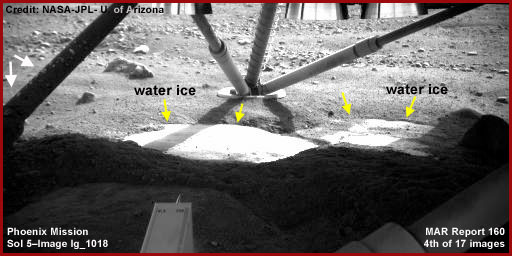
Now the above fourth image
takes us all the way back to near the beginning Sol
5 of the Phoenix Lander settling on Mars. This is the first of the
images of the underside of the lander. As you can see, even though poorly
seen here, the strut in the upper left corner pointed out by the two white
arrows already has droplets on it. Also, the small depression does indeed
appear to be filled with likely water that has now iced back over. Note its
increased sunlight reflective quality relative to the soil around it and how
its surface is level with a distinct shoreline. This is consistent with surface
water ice being melted by the landing thruster and freezing back over by this
5th day.
Note the way the strut shadow behaves differently and is more faded out as
it crosses this small sheet of ice area relative to the much darker shadow
on the true soil closer to the background landing pad. Now go back up to the
first and second images in this report. There note how the strut shadows end
abruptly at the edge of the ice and do not appear to cross it. This is because
the white water ice is much more light reflective than the surrounding soil
and the ice reflectivity in the much stronger sunlight there is over powering
the strut shadow crossing its surface.
But, that isn't quite all. Note in the above fourth image the second pair
of yellow arrows on the right. This appears to be a second puddle of a little
more shallow water ice that is on a slightly lower level than the puddle to
the left. It is not hard to imagine the water ice melting from the heat of
the thruster blast and splashing mud water up onto the strut on the left in
the landing process. Also, just as soon as the heat from the thruster cut
off, the puddle of water on the left likely overflowed down into the more
shallow puddle on the right and over flowing from there out from under the
lander and into the immediately adjacent open terrain.
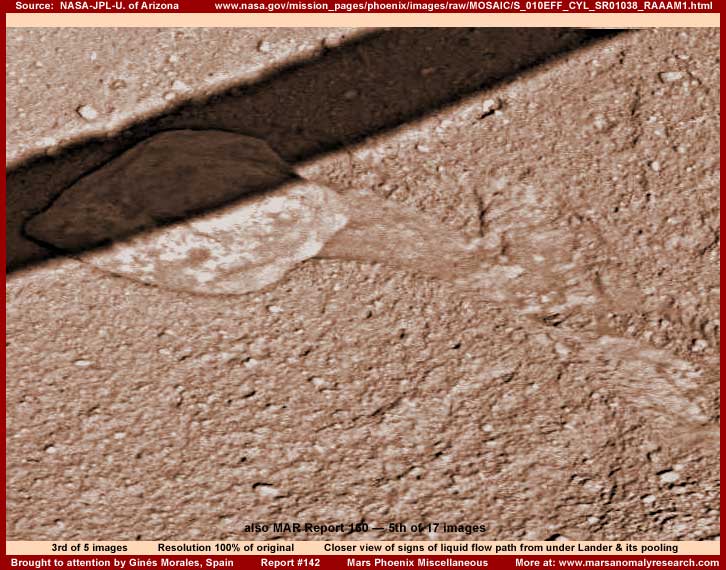
Do any of you remember my
back on July 2, 2008 in which I reported the above (fifth image here)
liquid flow and pooling evidence? The above was one of the two images posted
back then relating to this.
I received some feedback back then indicating the above pool was actually
an elevated rock as evidenced by the shadow crossing over it and being offset
by it as you can see above. The few making such observations of course did
not take the water flow path evidence crossing the ground up to this object
into sufficient consideration nor did they take into consideration that the
shadow crossing the pool of dirty ice could have been due to image manipulation
at official level. The above image's liquid flow and pooling evidence in the
open strongly suggests that this likely came from the second puddle source
on the right under the lander pointed out in the 4th image.
Probably few will remember but in my Report
#138 back on April 24, 2008 before Phoenix ever got to Mars, I questioned
the truth of the Phoenix Mission and that the real mission was doing something
in secret elsewhere. I questioned whether it was really landing where it was
suppose to and that the mission itself was likely geared to report and meant
to confirm limited and incremental water evidence on Mars. I still suspect
that and the accumulated Phoenix evidence here tends to support that consideration.
Not so sure? Okay let's recap what was found by the Phoenix Mission. I'm not
going to waste an image of it here but the main thing that it found was water
ice just below the soil surface revealed by the digger tool. If you are a
secrecy type that was a tremendous revelation requiring even consulting with
the President to further build the intended psychological impact. Even the
thought that certain microorganisms "might" could actually survive
in the soil was additional spice.
Less obvious a little later was a claim that snow was experienced at the Phoenix
site. Snow of course is nothing more than frozen rain. Likewise frost was
revealed accumulating daily in the terrain and on the lander. Less obvious
but more plentifully pushed in science circles were many images of atmospheric
clouds and you will find four samples of that below. All of this of course
was dutifully reported in varying degrees by the press.
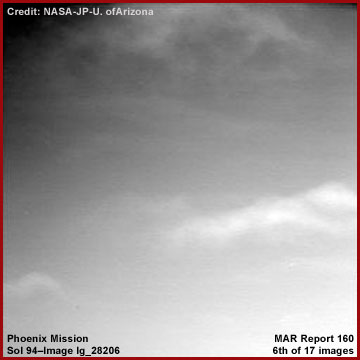 .
.
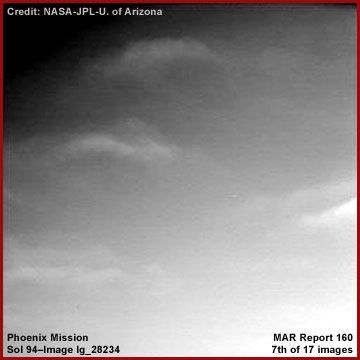
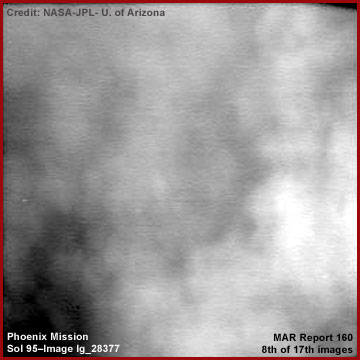 .
.
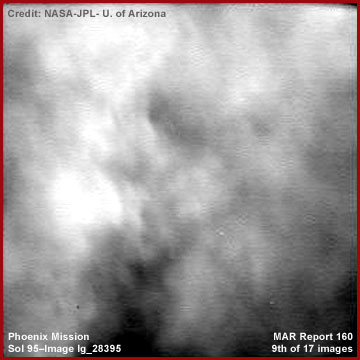
In the above sixth through
ninth sample images, I've shown two general types of clouds. Note the wispy
layered ones in the top row and the more complex and turbulent ones in the
bottom row. They obviously look like anything you might see here on Earth.
However, the Mars atmosphere is suppose to be 95.32% carbon dioxide (CO2)
with all the other elements sharing just the tiny 4.68% left over. Now it
should be noted that CO2 in concentrations above 5%
become toxic by Earth standards and Mars CO2
levels as officially promoted are 19 times more than that amount. In other
words, if we were exposed to the Mars atmosphere, not only would we suffocate
from the lack of nitrogen and oxygen, the Mars atmosphere would be a deadly
poison to us many times over.
Now when it comes to water vapor, Mars is officially suppose to be just 0.03%
water vapor versus Earth's about 1.00%. Yet look at those Mars clouds of moisture
in the above 6th through 9th images. Yes the Mars atmosphere may be thin of
water vapor compared to Earth, especially since ours is primarily a water
world, but the above clouds certainly do not look much like that tiny trace
0.03% percentage now do they.
If that isn't enough, did you suspect that there are also no less than four
short videos in the official NASA Phoenix science data for press releases
showing moving Mars clouds around the landing site? Obviously someone wanted
to make very sure that the targeted audience (scientists, academics, etc.)
got the water vapor clouds message. Check them out at the four links below.
Martian
Clouds Above Phoenix
Dark
Skies and Clouds Move in at Phoenix Site
Ice Clouds in Martian Arctic (Accelerated Movie)
Nighttime Clouds in Martian Arctic (Accelerated Movie)
Collectively, and it doesn't
even include frost and snow also revealed, the above videos amount to a lot
of pushing water vapor presence on Mars relative to what we've historically
seen coming out of NASA and JPL. Of course I'm sure they would be quick to
point out that the water is locked in the South Polar Region soil or in thin
layers on top of the ground or as only trace water vapor in the atmosphere.
As for life, that is carefully relegated to some maybe
possible microorganisms and a maybe possible
plant that the soil might have supported in the
ancient past. Talk about your tiny incremental creeping up on something! Even
the so called liquid water in the form of the muddy drops on the struts is
just a tiny temporary thing and basically much to do about very little in
light of the true situation on Mars.
Even so, and this is key, it appears that someone is trying to turn the blindness
created in the science community to a small degree away from the rigid blind
dogma of no water at all and no life at all toward some slightly increased
possibilities regarding water, atmosphere and life. At that speed, in another
10 or 15 years or so down the line, we might even be allowed the discovery
of a rare patch of water 2-3 feet across and nearly microscopic lichen growing
on a rock near it. Are you ready for that speedy and giant leap forward?
Okay, we've had a recap as to the type of evidence and what appears to be
the purpose of the Phoenix Mission and my "opinion" of it as manipulation.
Now let's take a look in the next Part-2
at some comparison samplings of older water ice, clouds, and bio-life evidence
from the MGS MOC data that our world scientific brain pool has passed over
and found not compelling. You must decide for yourself whether it has any
merit or not.
Just remember that, when you scientists and academics are looking at this
Part-2 evidence, the Phoenix mission reporting now sends the signal to your
reluctant and reputation bound consensus community that it is now semi-approved
to actually consider the presence of surface water ice and atmospheric water
vapor on Mars. In other words, secrecy itself has turned a corner and indicated
the way. So it is now no longer entirely against official dogma or heretically
violating official secrecy to consider these possibilities.
DOCUMENTATION
http://phoenix.lpl.arizona.edu/images/gallery/lg_7983.jpg:
This link takes you to the official Sol 31 lg_7983
Phoenix science data image strip from which my 1st image of the lander underside
evidence above was drawn. Note that the view is upside down in the official
strip because it is taken from the lander's articulating backhoe arm and will
need to be flipped vertically and horizontally to achieve the right side up
orientation to match my images and those of the scientists and media.
http://phoenix.lpl.arizona.edu/images/gallery/lg_11900.jpg:
This link takes you to the official Sol 31 lg_11900
Phoenix science data image strip from which my 2nd image of the lander underside
evidence above was drawn. Note that the view is upside down in the official
strip because it is taken from the lander's articulating backhoe arm and will
need to be flipped vertically and horizontally to achieve the right side up
orientation to match my images and those of the scientists and media.
http://phoenix.lpl.arizona.edu/images/gallery/lg_26263.jpg:
This link takes you to the official Sol 97 lg_26263
Phoenix science data image strip from which my 3rd image of the lander underside
evidence above was drawn. Note that the view is upside down in the official
strip because it is taken from the lander's articulating backhoe arm and will
need to be flipped vertically and horizontally to achieve the right side up
orientation to match my images and those of the scientists and media.
http://phoenix.lpl.arizona.edu/images/gallery/lg_1018.jpg:
This link takes you to the official Sol 5 lg_1018
Phoenix science data image strip from which my 4th image of the lander underside
evidence above was drawn. Note that the view is upside down in the official
strip because it is taken from the lander's articulating backhoe arm and will
need to be flipped vertically and horizontally to achieve the right side up
orientation to match my images and those of the scientists and media.
http://www.nasa.gov/images/content/239391main_S_010EFF_CYL_SR01038_RAAAM1.jpg
: This link takes you to the official Phoenix science data image strip from
which my 5th image liquid flow and pooling evidence above was drawn for both
Report #142 and this report.
http://phoenix.lpl.arizona.edu/images/gallery/lg_28206.jpg:
This link takes you to the official Sol 94 lg_28206
Phoenix science data image strip from which my 6th sampling image of atmospheric
clouds evidence above was drawn.
http://phoenix.lpl.arizona.edu/images/gallery/lg_28234.jpg:
This link takes you to the official Sol 94 lg_28234
Phoenix science data image strip from which my 7th sampling image of atmospheric
clouds evidence above was drawn.
http://phoenix.lpl.arizona.edu/images/gallery/lg_28377.jpg:
This link takes you to the official Sol 95 lg_28377
Phoenix science data image strip from which my 8th sampling image of atmospheric
clouds evidence above was drawn.
http://phoenix.lpl.arizona.edu/images/gallery/lg_28395.jpg:
This link takes you to the official Sol 95 lg_28395
Phoenix science data image strip from which my 9th sampling image of atmospheric
clouds evidence above was drawn.
![]()